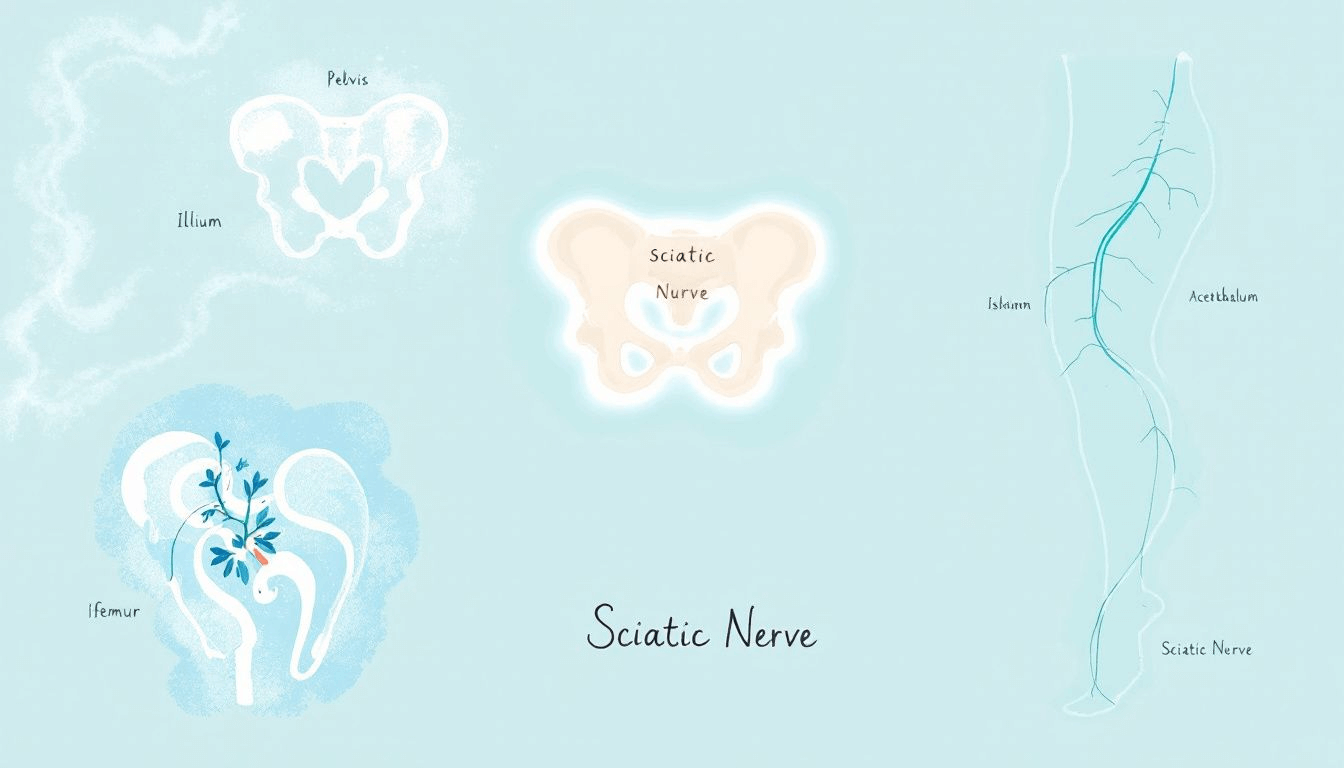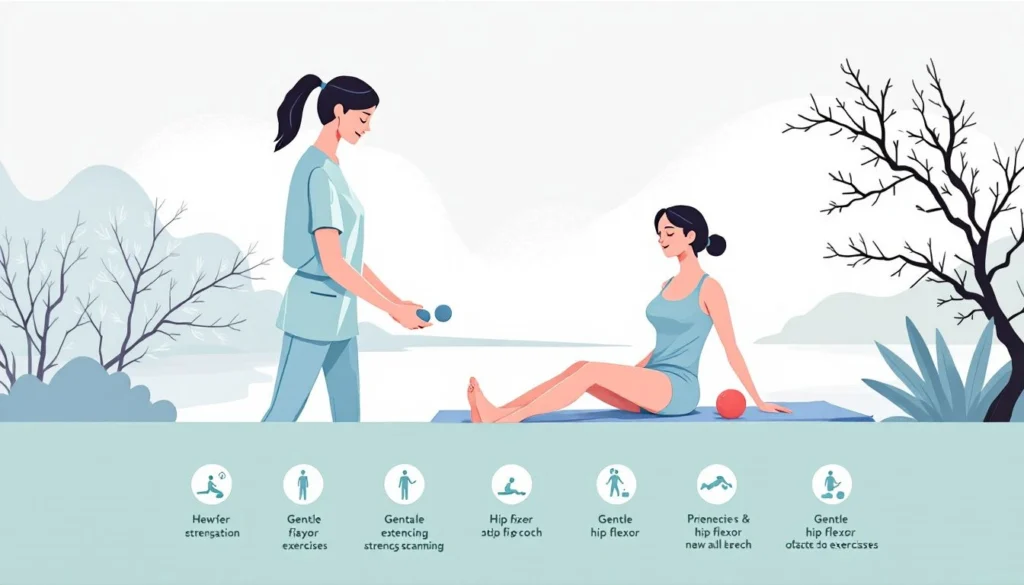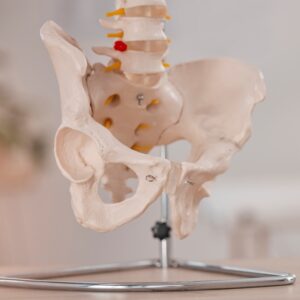Struggling with hip nerve pain and looking for relief? This guide explores how to relieve hip nerve pain through home remedies and exercises for better comfort and mobility.
Key Takeaways
- Hip nerve pain often results from a pinched nerve due to factors such as injuries, inflammation, and overuse, leading to symptoms like weakness and numbness.
- Effective home remedies for relieving hip nerve pain include rest, alternating heat and cold therapy, and using over-the-counter anti-inflammatory medications combined with gentle stretching exercises.
- Incorporating strengthening exercises, maintaining a healthy weight, and making lifestyle changes can help prevent hip nerve pain and improve overall joint function.
Understanding Hip Nerve Pain
When a nerve in the hip becomes compressed, often due to pressure from surrounding tissues, it can lead to symptoms like pain, weakness, and numbness. This condition is frequently caused by factors such as injuries or inflammation stemming from conditions such as arthritis or bursitis. Overuse through repetitive movements may also result in this type of compression. The impact on daily life can be significant, influencing one’s comfort and ability to perform everyday tasks.
Sciatica is a common manifestation of hip-related nerve issues where compression of the sciatic nerve leads to sharp pain that might include tingling sensations and even leg numbness. Notably emanating from the lumbar spine down into the hips and legs, these pains exemplify how connected our nervous system truly is. Early recognition of these signs allows for quicker intervention aimed at mitigating more severe underlying problems.

Encountering a pinched nerve specifically around the hip area introduces various degrees of discomfort ranging anywhere from brief stings resembling electrical shocks all the way up intense chronic agony exacerbated by physical activity.
Frequent targets being key nerves like sciatic or pudendal ones among others within close proximity thereof Allowing timely acknowledgement and prompt action regarding said distress hopefully prevents adverse outcomes while paving the path towards finding appropriate alleviation methods.
GET IN TOUCH
Filling out this form is the fastest way to reach our team, once completed please be sure to check your email inbox for a confirmation message.
Home Remedies for Hip Nerve Pain

Securing relief from pinched nerve pain in the hip often begins with at-home care. Allowing your body to rest can be critical as it minimizes pressure on the afflicted nerve, thus facilitating its recovery. Employing a combination of heat and cold treatments may offer substantial relief of discomfort. Ice packs are particularly beneficial for managing acute pain within the initial days, while applying heat aids in relaxing stiff muscles and enhancing circulation.
Common over-the-counter medicines such as ibuprofen, naproxen, and acetaminophen are pivotal for controlling hip-related pain. These anti-inflammatory agents help alleviate inflammation and decrease compression on the troubled nerve, which is why they’re integral components of home treatment strategies against pinched nerve discomfort. When these medications are paired with appropriate rest and gentle physical activities, their impact can be magnified.
Many techniques employed by professionals during physical therapy sessions—like icing affected areas or utilizing anti-inflammatory drugs—are replicable at home to curb swelling and mitigate nerve pain sensations effectively. Applying these self-care remedies consistently could greatly assist in relieving symptoms associated with pinched nerves in the hip area while concurrently fostering greater ease overall when incorporated into an extensive regimen aimed at resolving pinched nerves through consistent management practices.
Gentle Stretches for Immediate Relief
Engaging in gentle stretches can be tremendously beneficial for mitigating the pain associated with the hip nerve. By easing tension on constricted muscles or tendons, these stretching exercises not only diminish distress but also improve pliability. Introducing a regimen of stretches into your everyday routine may greatly advance your range of motion and lessen discomfort linked to nerves.
Zeroing in on stretches that specifically target the piriformis and gluteal muscles can offer particular advantages to those plagued by hip nerve pain. Persistent stretching of these muscle groups has been shown to mitigate pain effectively while also bolstering mobility, which underscores their importance within any approach aimed at managing pain.
Adopt these targeted stretches as a remedy for swift relief from such pains.
Piriformis Stretch
Tightness in the piriformis muscle, which is situated in the buttock area, may be a significant factor for pain involving the hip nerve. This tightness frequently results from extended periods of sitting and insufficient stretching exercises. To mitigate this issue and ease sciatic nerve discomfort, there’s a specific stretch aimed at relaxing the piriformis muscle.
To perform it, sit on a flat surface with your legs fully extended in front of you. Next, cross one leg over to rest your foot near the opposite knee so that it lies flat against it. You should then gently pull this crossed leg toward your torso while maintaining hold for approximately 20-30 seconds before switching to carry out the same process on alternate side.
Engaging in this stretching exercise works towards lessening muscular tension and enhancing movement within your hip joint.
Glutes Stretch
Situated in the buttocks, the gluteal muscles are pivotal for bolstering the lower spine and hip joints. Strain within these muscles may exacerbate pain in both areas by triggering discomfort along the nerves. Thus, loosening up these muscles through stretching can significantly ease nerve-related distress.
To carry out an efficient stretch targeting your glutes, plant yourself on a flat surface and overlap one leg across its counterpart’s thigh. Keeping your spine erect, slowly rotate your upper body toward the side of your bent leg while leveraging an arm to maintain balance if needed. Sustain this posture between 20-30 seconds before alternating sides to aid in lessening tightness around the gluteals, which is effective for mitigating pinched nerve pain.
Full Body Stretches
Incorporating full-body stretches into your routine is crucial for enhancing flexibility and mitigating pain associated with the nerves in the hip. By performing these stretching exercises, one not only boosts blood flow but also eases muscle tension around the hip area. This comprehensive method assists in warding off nerve-induced pain while contributing to an improved state of health.
Amongst various effective stretches, both cat-cow and downward dog are particularly beneficial. The former involves a sequence of back arches and rounds, whereas the latter focuses on elongating the entire posterior chain of your body. Regularly practicing such stretches promotes increased flexibility and serves as a preventive measure against discomfort linked to nerves, thereby forming a vital component of everyday wellness practices.
Home Remedies for Hip Nerve Pain

Engaging in gentle stretches can offer prompt relief of discomfort, whereas exercises designed to fortify the body deliver enduring advantages. These strengthening activities bolster stability and diminish the likelihood of recurring nerve compression issues. Engaging in balance training and slowly increasing weight-bearing exercise routines are instrumental for enhancing strength and providing stable support.
By focusing on strengthening the gluteal muscles, undue tension on the lower back is lessened, promoting proper spinal posture which contributes to sustained respite from pain associated with hip nerves. Persistently engaging in physical activity is crucial for sustaining a healthy body mass that helps relieve additional stress placed on nerves around the hip region.
Outlined below are several targeted reinforcement exercises aimed at mitigating such pains.
Core Strengthening
Fortifying the core muscles is essential for providing stability to the body when engaged in physical activities, which can minimize pressure on the hip and avert possible harm. It’s particularly important to bolster abdominal and back muscles in order to prevent nerve pain associated with the hip.
Incorporating exercises such as planks, bridges, and leg raises into one’s routine enhances core muscle strength and improves bodily movement patterns. These improvements do not only reduce susceptibility to injury within the hip region, but also boost your general steadiness and flexibility.
Hip Flexor Exercises
Strengthening the muscles around the hip joint through specific hip flexor exercises is essential for mitigating nerve pain resulting from nerve compression. Engaging in these targeted movements can enhance hip functionality by reducing tension on the nerves.
Incorporating moves such as knee lifts and lunge stretches focuses on fortifying the hip flexors, which bolsters support for adjacent muscles and augments mobility. Such exercise routines are instrumental in achieving sustained alleviation of pain associated with the nerves in the hip area while concurrently promoting better function of the hips.
Leg Strengthening
Exercises aimed at fortifying the legs play a crucial role in enhancing stability and mitigating undue stress around the hip region. By bolstering leg strength, they provide essential support for efficient functioning of the hips.
Regimens including leg raises, hip circles, and lateral squats are specifically designed to focus on muscles within the hip area, thus fostering greater stability and lessening tension exerted on the hip joint. Engaging in these exercises can significantly bolster leg muscle power while simultaneously alleviating pressure from lateral femoral cutaneous nerves.
Gentle Stretches for Immediate Relief
Engaging in gentle stretches can be tremendously beneficial for mitigating the pain associated with the hip nerve. By easing tension on constricted muscles or tendons, these stretching exercises not only diminish distress but also improve pliability. Introducing a regimen of stretches into your everyday routine may greatly advance your range of motion and lessen discomfort linked to nerves.
Zeroing in on stretches that specifically target the piriformis and gluteal muscles can offer particular advantages to those plagued by hip nerve pain. Persistent stretching of these muscle groups has been shown to mitigate pain effectively while also bolstering mobility, which underscores their importance within any approach aimed at managing pain.
Adopt these targeted stretches as a remedy for swift relief from such pains.
Piriformis Stretch
Tightness in the piriformis muscle, which is situated in the buttock area, may be a significant factor for pain involving the hip nerve. This tightness frequently results from extended periods of sitting and insufficient stretching exercises. To mitigate this issue and ease sciatic nerve discomfort, there’s a specific stretch aimed at relaxing the piriformis muscle.
To perform it, sit on a flat surface with your legs fully extended in front of you. Next, cross one leg over to rest your foot near the opposite knee so that it lies flat against it. You should then gently pull this crossed leg toward your torso while maintaining hold for approximately 20-30 seconds before switching to carry out the same process on alternate side.
Engaging in this stretching exercise works towards lessening muscular tension and enhancing movement within your hip joint.
Glutes Stretch
Situated in the buttocks, the gluteal muscles are pivotal for bolstering the lower spine and hip joints. Strain within these muscles may exacerbate pain in both areas by triggering discomfort along the nerves. Thus, loosening up these muscles through stretching can significantly ease nerve-related distress.
To carry out an efficient stretch targeting your glutes, plant yourself on a flat surface and overlap one leg across its counterpart’s thigh. Keeping your spine erect, slowly rotate your upper body toward the side of your bent leg while leveraging an arm to maintain balance if needed. Sustain this posture between 20-30 seconds before alternating sides to aid in lessening tightness around the gluteals, which is effective for mitigating pinched nerve pain.
Full Body Stretches
Incorporating full-body stretches into your routine is crucial for enhancing flexibility and mitigating pain associated with the nerves in the hip. By performing these stretching exercises, one not only boosts blood flow but also eases muscle tension around the hip area. This comprehensive method assists in warding off nerve-induced pain while contributing to an improved state of health.
Amongst various effective stretches, both cat-cow and downward dog are particularly beneficial. The former involves a sequence of back arches and rounds, whereas the latter focuses on elongating the entire posterior chain of your body. Regularly practicing such stretches promotes increased flexibility and serves as a preventive measure against discomfort linked to nerves, thereby forming a vital component of everyday wellness practices.
When to Seek Professional Help
If you’re experiencing nerve pain in the hip, adopting certain home remedies and making lifestyle adjustments might provide relief. If your hip pain continues for more than a few days despite taking over-the-counter medication and resting, it’s important to see a healthcare provider. Ongoing hip pain could be indicative of additional health issues that require medical attention. Leading research by Yale University seems to indicate that starting stem cell treatments can reduce the need for hip replacement surgery by up to 10%.
When nerves are severely compressed or pinched, they can cause persistent discomfort. Without appropriate treatment, this condition has the potential to result in irreversible damage to the nerves. Treatment options may range from medications and physical therapy sessions to surgery when conservative methods fail to alleviate the symptoms. Surgical intervention is particularly considered when there is an escalation of neurological symptoms or absence of relief from other treatments for nerve entrapment in the hip area. Early action helps prevent long-standing problems associated with pinched nerves.

Role of Physical Therapy in Managing Hip Nerve Pain
Physical therapy is vital in addressing nerve pain associated with the hip. The goal of physical therapy is to relieve discomfort and improve the function of the hip by employing specific exercises. These therapeutic activities work towards reducing compression on the sciatic nerve, bolstering lower back muscles, and increasing overall flexibility.
In managing sciatica through physical therapy, standard methods include a combination of stretching and strengthening routines alongside aerobic conditioning. Physical therapists recommend targeted exercises aimed at fortifying and elongating muscles that envelop the pinched nerve, thereby facilitating recuperation.
Employing these strategies helps to alleviate tension on affected areas while also promoting better movement capabilities. Ultimately, this can lead to sustained relief from pain caused by issues related to nerves in the hip region.
Robotic Spine Surgery for Severe Cases
In instances of intense hip nerve pain, robotic spine surgery stands as a cutting-edge solution. Utilizing this technique involves the use of a camera arm and an instrument-equipped surgical arm, both meticulously managed by the surgeon via a computer console. This setup provides the surgeon with a three-dimensional view that is greatly enlarged, enhancing precision during surgery.
To navigate towards the precise spinal area for treatment, medical images are uploaded into the robot to craft a detailed plan which then directs its movements. Compared to traditional techniques, this method boasts increased simplicity and accuracy.
Summary
In summary, hip nerve pain can significantly affect your quality of life, but there are numerous ways to find relief. Understanding the causes and symptoms of hip nerve pain is the first step towards effective management. Home remedies, gentle stretches, and strengthening exercises can provide immediate and long-term relief.
Lifestyle changes and knowing when to seek professional help are crucial in preventing and managing hip nerve pain. Physical therapy and, in severe cases, robotic spine surgery offer advanced treatment options. By taking proactive steps and incorporating these strategies, you can alleviate your pain and improve your overall well-being.
FREQUENTLY ASKED QUESTIONS
Hip nerve pain is commonly caused by injuries, inflammation from conditions such as bursitis or arthritis, and overuse from repetitive movements.
Addressing these underlying issues can help alleviate the pain.

